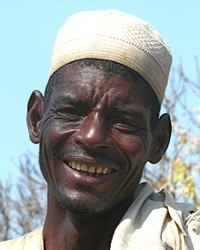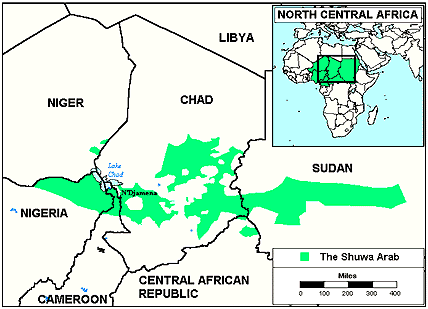The Shuwa Arabs speak either the Chadian or Sudanese dialect of Arabic. They consist of 27 subtribes. Their ancestors entered western Sudan between the twelfth and thirteenth centuries, gradually moving east and west from there. By the eighteenth century, the Shuwa Arabs were primarily concentrated to the north and east of Lake Chad. Their tribes continued to move eastward until they became widely scattered across the flat plains of West Africa. Over the centuries, they intermarried with African tribes but retained most of their Arab culture and language.
The Shuwa Arabs are commonly referred to as the "Baggara." This name is derived from the Arabic word bagger, meaning "cow," and refers to the Arab tribes in West Africa who are cattle herders. They are spread from the Lake Chad region eastward to the Nile River in the countries of Sudan, Niger, Chad, Cameroon, Nigeria and the Central African Republic. They live in a hot, semi-arid climate with zones ranging from sparse shru lands to wooded grasslands.
They live in nine countries, including Libya.
No matter where the live, the roles of Shuwa Arab men and women are very distinct. The women are responsible for milking the cows. They sell the raw milk to factories and processed milk either at the marketplace or door to door. They keep the earnings for themselves or use it to pay household expenses. The women also build houses, tend to the children, go for water, prepare daily meals, slaughter chickens, and trade in the marketplace for needed goods like pottery. Women also make mats and leather goods.
The men are primarily involved with caring for the herds. When the time is right, they slaughter cattle for meat and leather. They also plant and harvest the crops. Men don't take care of the children as much as their wives, but they are part of the process. He sometimes disciplines his children and teaches them life skills like animal husbandry.
Their livestock are essential for their survival. The people feed on milk and cheese during the winter. Shuwa Arabs use animal fat and dung as healing ointments and skins to make clothing and tents. They make weapons and ornaments out of cow bones.
Shuwa Arabs live in simple dome-shaped tents built by the women. They are portable structures that can easily be packed and moved along with the herds. When preparing to set up a new camp, the bed for the woman and small children is built first, then the tent is put up around it. The tents are built by placing saplings into holes in the ground, then bending them over and tying them at the top. Smaller branches are tied into the frame and then covered with thatch or grass mats. The tents are arranged in a circle, and the cattle are brought inside the circle at night to prevent them from straying or being stolen.
Married women own the tents and their housekeeping contents. The men build a "sun shelter" either inside or just outside of the camp. They gather there to eat, talk, nap or entertain their friends.
Baggara marriages are often polygamous. If a man has two wives, one of them may live in a pastoral camp, while the other lives in a farming village. Products and labor are exchanged between the two households, adding to the family's income and making it more flexible.
Partly due to climate issues leading to a scarcity of water, some Shuwa Arabs are finding it difficult to maintain a semi-nomadic lifestyle, so they are settling down. Their future is uncertain and some are becoming desperate.
Some Shuwa Arabs wear Western clothes while others do not. Some wear the traditional jalabiya, a long loose-fitting garment with long sleeves. Women wear a toub, which is traditional in this part of the world.
The Baggara have been Muslims since the thirteenth century. They wear the clothes prescribed by the Muslim religion, and bury their dead facing Mecca, the "holy city" of Islam. Yet they also believe in evil spirits. Each morning, a man sneezes in order to rid his nostrils of the evil spirit who slept there the night before.
It has been a common occurrence for Shuwa Arabs to have violent conflicts with settled people. There is not enough water for everyone, and Sudan is frequently gripped in war. The Shuwa Arabs are often involved in these fights.
One of their greatest needs is for veterinarians. Shuwa Arab men buy their own medicine for their cattle and administrate it themselves. Few have access to modern medicine. With less water and grazing lands, their livestock are prone to sickness.
Pray for a just and lasting peace in Libya.
Pray for Christians who understand water issues to help the people of Libya find more water sources.
Pray for Christian veterinarians to help Shuwa Arabs in Libya with their livestock.
Pray for Shuwa Arab family leaders to have dreams of the righteous and risen Christ that will open families to the only Savior.
Ask the Lord to raise up Shuwa Arab disciples who will make more disciples no matter what the cost.
Scripture Prayers for the Baggara, Shuwa Arab in Libya.
https://en.wikipedia.org/wiki/Baggara_Arabs
https://www.facebook.com/watch/?v=1913232582168826
https://en.wikipedia.org/wiki/Sudanese_Arabs
https://www.101lasttribes.com/tribes/baggara.html
| Profile Source: Joshua Project |












